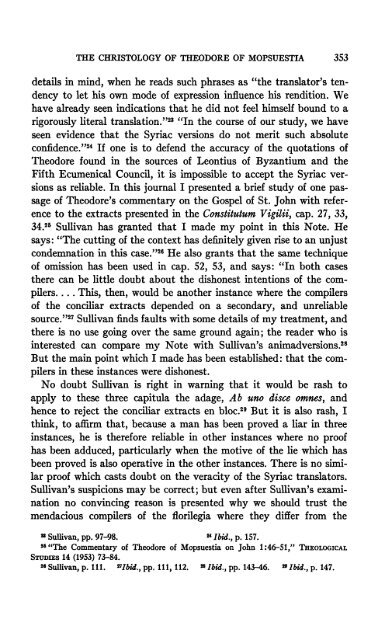ANNOTATIONS ON THE CHRISTOLOGY OF THEODORE OF ...
ANNOTATIONS ON THE CHRISTOLOGY OF THEODORE OF ...
ANNOTATIONS ON THE CHRISTOLOGY OF THEODORE OF ...
You also want an ePaper? Increase the reach of your titles
YUMPU automatically turns print PDFs into web optimized ePapers that Google loves.
<strong>THE</strong> <strong>CHRISTOLOGY</strong> <strong>OF</strong> <strong>THE</strong>ODORE <strong>OF</strong> MOPSUESTIA 353<br />
details in mind, when he reads such phrases as "the translator's tendency<br />
to let his own mode of expression influence his rendition. We<br />
have already seen indications that he did not feel himself bound to a<br />
rigorously literal translation." 23 "In the course of our study, we have<br />
seen evidence that the Syriac versions do not merit such absolute<br />
confidence." 24 If one is to defend the accuracy of the quotations of<br />
Theodore found in the sources of Leontius of Byzantium and the<br />
Fifth Ecumenical Council, it is impossible to accept the Syriac versions<br />
as reliable. In this journal I presented a brief study of one passage<br />
of Theodore's commentary on the Gospel of St. John with reference<br />
to the extracts presented in the Constitutum Vigilii, cap. 27, 33,<br />
34. 25 Sullivan has granted that I made my point in this Note. He<br />
says: "The cutting of the context has definitely given rise to an unjust<br />
condemnation in this case." 26 He also grants that the same technique<br />
of omission has been used in cap. 52, 53, and says: "In both cases<br />
there can be little doubt about the dishonest intentions of the compilers.<br />
.. . This, then, would be another instance where the compilers<br />
of the conciliar extracts depended on a secondary, and unreliable<br />
source." 27 Sullivan finds faults with some details of my treatment, and<br />
there is no use going over the same ground again; the reader who is<br />
interested can compare my Note with Sullivan's animadversions. 28<br />
But the main point which I made has been established: that the compilers<br />
in these instances were dishonest.<br />
No doubt Sullivan is right in warning that it would be rash to<br />
apply to these three capitula the adage, Ab uno Usee otnnes, and<br />
hence to reject the conciliar extracts en bloc. 29 But it is also rash, I<br />
think, to affirm that, because a man has been proved a liar in three<br />
instances, he is therefore reliable in other instances where no proof<br />
has been adduced, particularly when the motive of the lie which has<br />
been proved is also operative in the other instances. There is no similar<br />
proof which casts doubt on the veracity of the Syriac translators.<br />
Sullivan's suspicions may be correct; but even after Sullivan's examination<br />
no convincing reason is presented why we should trust the<br />
mendacious compilers of the florilegia where they differ from the<br />
» Sullivan, pp. 97-98. * Ibid., p. 157.<br />
25 "The Commentary of Theodore of Mopsuestia on John 1:46-51," <strong>THE</strong>OLOGICAL<br />
STUDIES 14 (1953) 73-84.<br />
2 « Sullivan, p. 111. *Ibid., pp. Ill, 112.<br />
M Ibid., pp. 143-16. *» Ibid., p. 147.
















